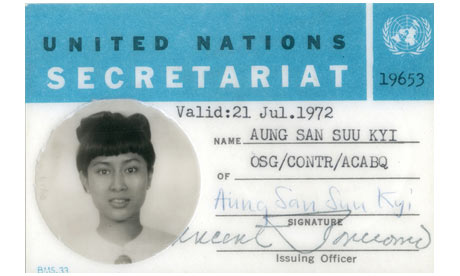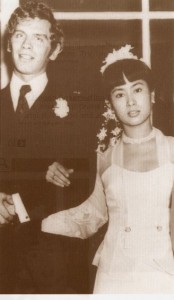The Mirror, Vol. 14, No. 690
Aung San Suu Kyi’s car is surrounded by supporters [Source AFP]
Many news media have one common theme on this Sunday: the release of Aung San Suu Kyi on Saturday, after having been under house arrest for 15 of the 21 years since 1990. Then the National League for Democracy – she was General Secretary of the party – had won 59% of the votes, and should have gained 392 of the 492 of the seats in the parliament of Burma. The power of the military prevented this, and had her isolated. On this Sunday, she was greeted again by a big crowds.
Now, while the question of what the next political steps will be is being discussed widely, also some personal memories are remembered. The Mirror joins those who share also elements of her personal life not so much known to the wider public. – She is the daughter of Aung San, who had led the creation of the Burmese army, and achieved Burma’s independence from British colonial rule in 1947 and then became prime minister. He and eight others were assassinated by political rivals in uniform during a cabinet meeting in the same year.
Later, her mother gained a role in government services as ambassador to India and Nepal, so that Aung San Suu Kyi had part of her education in New Delhi, graduating with a degree in politics in 1964, later obtaining a Bachelor of Art degree in Philosophy, Politics, and Economics in 1969 in Oxford.

An old ID card
“Sui Kyi was only 27 when the identity-card photo was taken. She worked for the UN in New York for three years, mainly on budget matters, after graduating from Oxford in 1969. She shared an apartment near the UN building with a family friend from Burma, cooked Burmese meals and wrote almost daily to her husband-to-be, Michael Aris, before they were married in 1972.”
.
Their personal relations had also to suffer from political intervention. – They lived in Bhutan, then in London, where she earned, in 1985, a doctorate degree at the School of Oriental and African Studies of the University of London. In 1988, she traveled to Burma to care for her mother, but started to get involved in the movement for democracy. After her husband had been diagnosed to have cancer and wanted to visit again, his application for a visitor’s visa was turned down – but the authorities suggested that Aung San Suu Kyi should rather visit her husband abroad. She had been under house arrest since 1989, but was at that time freed so that she could leave the country. As she was afraid she might not be allowed back into Burma, she could not meet her husband. He succumbed to his sickness in 1999, on his 53th birthday.
Aung San Suu Kyi’s political carrier started in 1988 when there were massive pro-democracy demonstrations on 8 August 1988 [8-8-88, later called the “8888 Uprising”] by students, joined by monks, women, doctors, and even children. On 26 August 1988 Aung San Suu Kyi – the daughter of the most important leader who overcame British colonial rule, was a speaker to about 500,000 people, calling for democracy. After thousands of people had been killed, a new military government was installed. However, as a reaction the National League for Democracy was created, Aug San Suu Kyi became it’s General Secretary. She was put under house arrest, but offered freedom, if she would leave the country to be with her foreign husband. But she stayed.
Some of her statements have been quoted frequently, like her speech about Freedom From Fear: “It is not power that corrupts but fear. Fear of losing power corrupts those who wield it and fear of the scourge of power corrupts those who are subject to it.”
And on government: “Government leaders are amazing. So often it seems they are the last to know what the people want.”
[Most of this information collected from sources in Wikipedia]
Among her statements after she was released, the following sentence has been quoted frequently:
The basis of democratic freedom is freedom of speech.
This freedom is, of course, not something which is to be used only in one’s close individual environment – the freedom of speech is for the public. And that means in our times: it is the freedom of speech to be practiced individually, but spread through the media – the press and the electronic media of radio and of television.
And this leads us back to the past week in The Mirror.
The Rich Content of Indices, When Read for What They Say
It is the press which took it up, when the results of carefully elaborated international social and economic data collection, analysis, and interpretation, were simply rejected as “wrong” and “biased” or “garbage” – it is the press which can act to help towards a rational use of such data for the improvement of problematic elements of our society, where some people are not prepared to face some real, but unpleasant insights.
The Lake is Going to Be Lost Forever
The people suffering directly from the filling up of the Boeung Kak lake protest. Without press reports, the public in the capital city of Phnom Penh would not know much about what actually happens there. Once the lake will be gone forever, nobody who now is silent should say they did not know. The developments were covered in some sections of the papers – not in all media.
That is, why a democratic society – to quote Aung San Suu Kyi again – needs the freedom of the speech – and alert journalists. And alert readers.
The basis of democratic freedom is freedom of speech.
Please recommend The Mirror also to your colleagues and friends.



Recent Comments